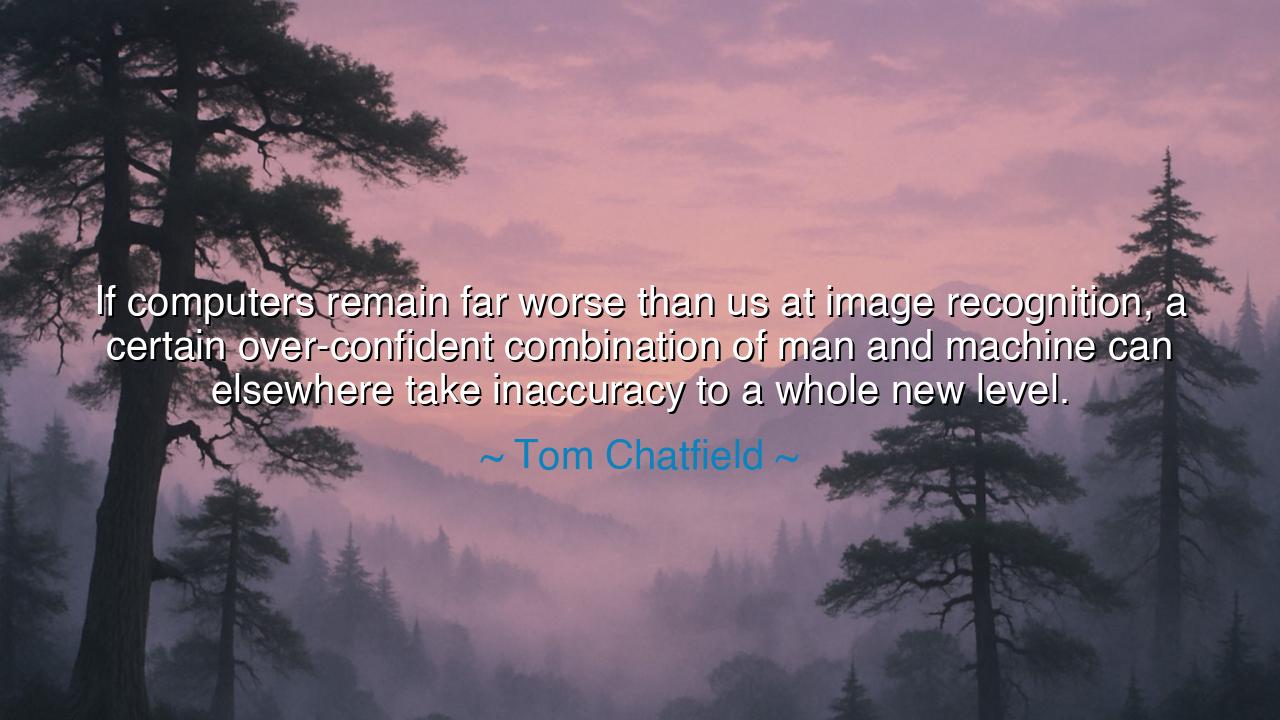
If computers remain far worse than us at image recognition, a
If computers remain far worse than us at image recognition, a certain over-confident combination of man and machine can elsewhere take inaccuracy to a whole new level.






In the unfolding age of silicon and shadow, Tom Chatfield, philosopher of the digital realm, spoke with measured warning: “If computers remain far worse than us at image recognition, a certain over-confident combination of man and machine can elsewhere take inaccuracy to a whole new level.” At first, his words may seem to concern only technology — the computer, the algorithm, the machine. But beneath the surface lies a deeper truth about the peril of pride, the limits of knowledge, and the folly of placing blind faith in our own creations. His voice, though modern, carries the cadence of the ancients: a reminder that every tool that magnifies human power can also magnify human error if wielded without humility.
To understand the weight of his words, one must recall the moment in history from which they arise. The twenty-first century stands as the great age of automation — when machines learn, see, and decide alongside their makers. Artificial intelligence, the craft of teaching machines to mimic human thought, promises wonders beyond imagining. Yet, as Chatfield observes, these machines are not gods; they are mirrors. They reflect not wisdom, but the flaws of their creators, dressed in the glittering armor of precision. When man and machine join hands without caution, the result is not perfection — it is overconfidence multiplied.
Consider, for instance, the realm of image recognition, where computers are taught to see. Even now, the most powerful systems can mistake a turtle for a rifle or a shadow for a face. Their logic, born of data and code, knows no context, no conscience, no nuance. And yet, we trust them — in medicine, in justice, in warfare. A self-driving car sees the road, but not the soul who crosses it. A surveillance camera identifies a face, but not the fear behind the eyes. Thus, Chatfield warns: when we combine human pride with machine imperfection, we create not clarity, but confusion — not truth, but error disguised as certainty.
There is a tale that echoes this truth: the story of the Maginot Line of France. After the Great War, believing they had mastered defense, the French built a fortress of steel and stone stretching hundreds of miles — a marvel of engineering meant to make invasion impossible. But in 1940, the enemy bypassed it entirely, striking where human imagination had failed to predict. The Maginot Line was a perfect tool, but a flawed idea. So it is with modern technology: when faith in our inventions blinds us to their limitations, we build fortresses that crumble at the first unexpected blow. The danger is not in the machine, but in the arrogance of its master.
What Chatfield calls the “over-confident combination of man and machine” is a new form of hubris — the belief that by fusing human intention with mechanical precision, we can transcend the flaws of both. Yet in truth, we often amplify them. The machine’s cold exactness magnifies our bias; its speed multiplies our misjudgment. What once required reflection now happens in an instant, and in that instant, entire systems of power and judgment move without pause. To trust a flawed intelligence, whether human or artificial, is to gamble with the truth itself.
But there is hope hidden in this warning. For Chatfield’s words are not a curse upon progress, but a call to consciousness. He asks us not to fear the machine, but to know it — to see clearly what it is and what it is not. The wise must learn to treat the computer not as a god, but as a companion; not as a seer, but as a servant. It is only when we remember that the heart must guide the hand, and the hand must guide the machine, that we can prevent the blind leading the blind into chaos. For wisdom is not in speed, nor in data, nor in computation — it is in discernment.
So, children of the digital dawn, let this truth be your compass: do not mistake power for wisdom, nor accuracy for truth. Question what the machine tells you, as you would question yourself. Seek always to understand, not merely to automate. Remember that progress without humility leads to ruin, just as fire without restraint consumes its master. Use technology as the ancients used the forge — to craft, not to conquer. For when the partnership between man and machine is guided by reverence, not arrogance, then knowledge becomes creation, and creation becomes enlightenment.
The lesson of Tom Chatfield’s words is eternal: that every tool we build reflects who we are. If we build with care and wisdom, our machines will extend our reach without corrupting our judgment. But if we build with haste and hubris, they will magnify our blindness until we can no longer see the truth we once sought. Thus, let the union of man and machine be not a marriage of pride, but a covenant of balance — a partnership between the mind that dreams and the conscience that must always awaken.






AAdministratorAdministrator
Welcome, honored guests. Please leave a comment, we will respond soon